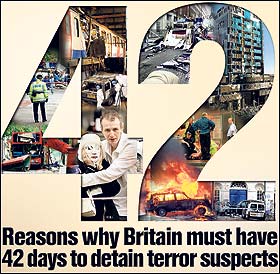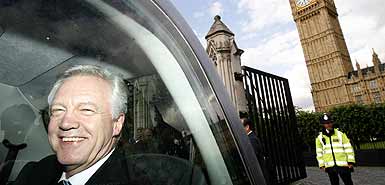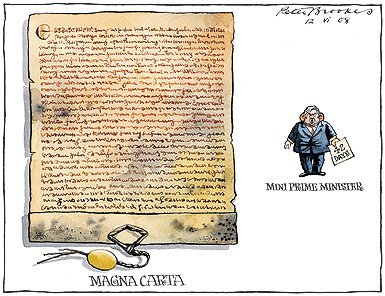 42 reasons to mock the Sun.
42 reasons to mock the Sun.
The 42-day extension isn't the only truly objectionable part of this latest bill, as Judith Sunderland reminds us. Post-charge questioning was first suggested to help negate the need for a further detention without charge extension, but is now in the bill despite that, to doubtless be used and abused by the police for any advantage that they see fit, regardless of the familiar "safeguards" of judicial supervision and recording of all interrogations. Unlike in pre-charge detention, the bill makes clear that if someone who's been charged refuses to answer questions post-charge that it will be potentially held against them in court, limiting the right to silence. Considering that as Peter Clarke made clear in his recent Torygraph article supporting an extension that many "terrorist suspects" opt for silence, this seems to be yet another way of increasing the chances of a successful prosecution, helpful when so many arrested under the Terrorism Acts have previously failed to be charged.
Perhaps logically, the bill also creates another new register for those convicted of terrorist offences, to add to those for sexual and violent offenders. Of concern will be whether those convicted of "lesser offences", such as the heinous crime of downloading "material that may be useful to terrorists", which can apply to almost anything that the prosecution puts its mind to, will fall under this definition that will almost certainly prevent someone from doing almost anything with their lives without being under constant suspicion. Most of those found with material downloaded from the internet have received generally lenient sentences, such as the infamous "lyrical terrorist", who had a 9-month suspended sentence handed down and Abdul Muneem Patel, who served 6-months for having a US army explosives manual under his bed, but the case of Mohammed Atif Siddique, who although took it the next level, received an astonishing 8 years (Abu Hamza, by comparison, for radicalising numerous individuals and preaching murder for years got 7) shows that not everyone who just might be inquisitive is going to get off so easily. Just what is such a register going to do except further embitter those who need to be won over rather than endlessly persecuted? It may well be justified for those sentenced to over 10 years, but the case has not been made for lesser sentences, and unless the proposal is modified to be considered on a case-by-case basis it ought to be rejected.
Then there's the other really objectionable part of the bill. Just get a load of this:
The bill would allow the home secretary to let an inquest take place without a jury if it would involve "the consideration of material that should not be made public in the interests of national security, in the interest of the relationship between the United Kingdom and another country, or otherwise in the public interest."
In other words, the government could more or less never have to let another potentially damaging inquest take place in public again. So broadly is this drawn that it wouldn't just cover the obvious, such as the embarrassing truth that the United States military doesn't give a shit about us and little things like "friendly fire" where they accidentally kill our servicemen or where the police accidentally kill Brazilians who get in the way when they're hunting terrorists, but also inquests into the deaths of those killed in terrorist attacks themselves, where the security services might be embarrassed by how some of those involved slipped through the net, right up to inquests which are required under Article 2 of the Human Rights Act, where a public inquiry is a necessity if there is significant evidence of wrongdoing by agents of the state where someone has lost their life. It is entirely open to ministerial interference and abuse, and desperately needs to be either substantially amended or defeated completely.
Desperation is once again wielding its ugly head. As legal adviser after legal adviser comes out against 42 days, the latest being the Scottish Lord Advocate Elish Angiolini, with the former holder of the post also supporting her, journalists on both the Sun and Times (spot the connection) made wholly spurious claims that MI5 had actually come out in favour of 42 days after reports stating the fact that it had not requested any further extension. All the statement by Jonathan Evans in fact does is repeat that it has not adopted a position on the matter. After obtaining the amazing support of Sir Hugh Orde, chief of police in Northern Ireland, the Sun is now bigging up the fact that the head of the British Muslim Forum also supports the government, claiming he's the country's "top Muslim", which must be a highly sought after position. His point that Muslims are just as likely to be victims of attacks as the perpetrators is a sound one, but to be victimised twice over as the extension of time will almost certainly blots out any benefit to the Muslim community which it might bring. As Anthony Barnett writes in a lengthy but brilliant post which I think is the best summation of all the reasons to oppose 42 days which I've come across, of the studies that have been undertaken into how legislation and radicalisation affect Muslim communities, all have concluded that such measures are only likely to make things worse, with the trust factor which is so important in disrupting future plots being unnecessarily affected.
The Sun, which did so much last time to help the opposition defeat 90 days, is just as hysterical this time round. It's produced 42 of the most ludicrous, at times hilarious reasons for why 42 days is necessary, which I'd fisk if I'd have the effort to go through such non-sequiturs and statements of the obvious masquerading as reasons. The very first, that there have been more than 15 attempted attacks since 2001 is just waiting to be ripped apart. Even if you count the 21/7 attempts as four separate attacks (also listed as a reason), then add last year's failed Tiger Tiger and Glasgow airport bombings (also listed as a reason), and Nick Reilly's "amateur-hour" attempt last month (also listed as a reason; spot a pattern here?), then you don't come close to 15. The other most laughable reasons are:
An al-Qaeda video obtained by MI5 after 7/7 identified the Queen as a potential terror target. It branded her ‘one of the severest enemies of Islam’.
Christ, if they're prepared to target the Queen they must really mean business! Better vote for 42 days just in case!
15. European lawyers argue it would breach the human rights of terror suspects and be out of step with the rest of Europe.
Yes, this really is a reason. This is the level of contempt the Sun has for the rule of law and civil liberties in general.
The above isn't really aimed at those wavering in the Commons however; it's for public digestion, and the blatant scaremongering which has been on-going for years has had the unsurprising effect that a majority (65% according to one poll, 40% according to today's in the Times, with another 35% with the right safeguards) supports banging up "terrorist suspects" for 42 days. Ask the same question but put "indefinitely" rather than an amount and you probably wouldn't get that dissimilar an answer, as ministers at the time of 90 days claimed they had up to 80% support based on similar polls. This is one of those few measures on which public opinion, while still being very carefully considered, ought to be disregarded. Many will give away liberties if they believe it will bring security, especially if they aren't personally threatened by it, but as that famous quote by Benjamin Franklin has it, those who would give up essential liberty to purchase a little temporary safety, deserve neither liberty nor safety.
In any case, 42 days will not even bring a little temporary safety. 42 days will not prevent terrorist attacks and will be unlikely to stop any potential terrorist from committing an attack that might have been prevented if he had not been released after 28. Can the police really claim that the extra two weeks will be anything other than give them extra leeway should they not be in the mood to sift through such vast amounts of material as they claim to have been? Will something pop up on the 42nd day that couldn't have been found with more rigorous investigation on the 28th?
The latest wheeze from the Labour front-benches has been to offer compensation for those held beyond 28 days who are then subsequently released without charge. All this does is again highlight the extreme deprivation of liberty that 42 days will be, while admitting that innocent individuals will be caught up in it. Is 28 days in a police cell not bad enough already? Why not save the compensation by not extending the limit and instead using it improve police resources, or to win over the very communities that will be most affected by it? This has been Labour's conundrum from the beginning. Rather than concessions and safeguards, all the alterations to the measure have done is make the legislation even worse while still not winning enough Labour MPs over to swing the vote.
Tomorrow Gordon Brown deserves to not just be defeated, but humiliated. If it means the end of his premiership, or the calling of a vote of confidence, then so be it. If it means David Miliband as the next prime minister, then again, so be it. It's only if this illiberal, draconian, unwarranted and completely unnecessary deprivation of hard won civil-rights is again defeated that maybe both the police and the government itself will finally get the message that enough is enough. If Brown wants to martyr himself, clinging to the chapter and verse of Blair before him that the public support it and he's doing what's right, then once again, so be it. Today's news that pensioner poverty, child poverty and inequality have all again risen shows where Brown's real concerns are: on attempting to bludgeon the opposition while winning over the worst of the "popular" press rather than on the core Labour support. His government is finished; tomorrow might well tell us whether he'll manage to last as long as even his beloved party.Labels: 42 days, civil liberties, death of Labour, Gordon Brown, Jacqui Smith, no compromise on 42 days, Scum-watch, Sun-watch, terror, terror laws, terror suspects, Terrorism Act 2008






